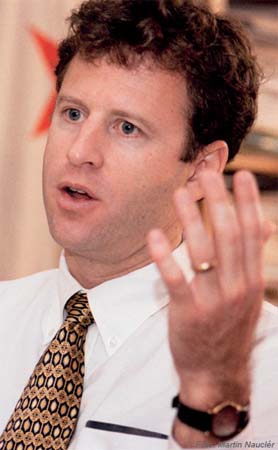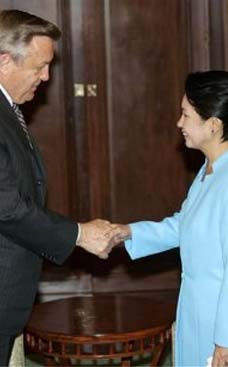
"In war, sometimes it’s important to pick the right adversary, and in Iraq we seem to have done so. A major factor in the sudden change in American fortunes has been the outpouring of popular animus against Al Qaeda and other Salafist groups, as well as (to a lesser extent) against Moktada al-Sadr’s Mahdi Army. These groups have tried to impose Shariah law, brutalized average Iraqis to keep them in line, killed important local leaders and seized young women to marry off to their loyalists. The result has been that in the last six months Iraqis have begun to turn on the extremists and turn to the Americans for security and help. The most important and best-known example of this is in Anbar Province, which in less than six months has gone from the worst part of Iraq to the best (outside the Kurdish areas). Today the Sunni sheiks there are close to crippling Al Qaeda and its Salafist allies. Just a few months ago, American marines were fighting for every yard of Ramadi; last week we strolled down its streets without body armor. " Michael O'Hanlon, a Senior Fellow at the Brookings Institute and a Visiting Lecturer at Princeton University, served as a Peace Corps Volunteer in Congo Kinshasa.
Michael O'Hanlon writes: We are finally getting somewhere in Iraq
A War We Just Might Win
By MICHAEL E. O’HANLON and KENNETH M. POLLACK
Published: July 30, 2007
VIEWED from Iraq, where we just spent eight days meeting with American and Iraqi military and civilian personnel, the political debate in Washington is surreal. The Bush administration has over four years lost essentially all credibility. Yet now the administration’s critics, in part as a result, seem unaware of the significant changes taking place.
Here is the most important thing Americans need to understand: We are finally getting somewhere in Iraq, at least in military terms. As two analysts who have harshly criticized the Bush administration’s miserable handling of Iraq, we were surprised by the gains we saw and the potential to produce not necessarily “victory” but a sustainable stability that both we and the Iraqis could live with.
After the furnace-like heat, the first thing you notice when you land in Baghdad is the morale of our troops. In previous trips to Iraq we often found American troops angry and frustrated — many sensed they had the wrong strategy, were using the wrong tactics and were risking their lives in pursuit of an approach that could not work.
Today, morale is high. The soldiers and marines told us they feel that they now have a superb commander in Gen. David Petraeus; they are confident in his strategy, they see real results, and they feel now they have the numbers needed to make a real difference.
Everywhere, Army and Marine units were focused on securing the Iraqi population, working with Iraqi security units, creating new political and economic arrangements at the local level and providing basic services — electricity, fuel, clean water and sanitation — to the people. Yet in each place, operations had been appropriately tailored to the specific needs of the community. As a result, civilian fatality rates are down roughly a third since the surge began — though they remain very high, underscoring how much more still needs to be done.
In Ramadi, for example, we talked with an outstanding Marine captain whose company was living in harmony in a complex with a (largely Sunni) Iraqi police company and a (largely Shiite) Iraqi Army unit. He and his men had built an Arab-style living room, where he met with the local Sunni sheiks — all formerly allies of Al Qaeda and other jihadist groups — who were now competing to secure his friendship.
In Baghdad’s Ghazaliya neighborhood, which has seen some of the worst sectarian combat, we walked a street slowly coming back to life with stores and shoppers. The Sunni residents were unhappy with the nearby police checkpoint, where Shiite officers reportedly abused them, but they seemed genuinely happy with the American soldiers and a mostly Kurdish Iraqi Army company patrolling the street. The local Sunni militia even had agreed to confine itself to its compound once the Americans and Iraqi units arrived.
We traveled to the northern cities of Tal Afar and Mosul. This is an ethnically rich area, with large numbers of Sunni Arabs, Kurds and Turkmens. American troop levels in both cities now number only in the hundreds because the Iraqis have stepped up to the plate. Reliable police officers man the checkpoints in the cities, while Iraqi Army troops cover the countryside. A local mayor told us his greatest fear was an overly rapid American departure from Iraq. All across the country, the dependability of Iraqi security forces over the long term remains a major question mark.
But for now, things look much better than before. American advisers told us that many of the corrupt and sectarian Iraqi commanders who once infested the force have been removed. The American high command assesses that more than three-quarters of the Iraqi Army battalion commanders in Baghdad are now reliable partners (at least for as long as American forces remain in Iraq).
In addition, far more Iraqi units are well integrated in terms of ethnicity and religion. The Iraqi Army’s highly effective Third Infantry Division started out as overwhelmingly Kurdish in 2005. Today, it is 45 percent Shiite, 28 percent Kurdish, and 27 percent Sunni Arab.
In the past, few Iraqi units could do more than provide a few “jundis” (soldiers) to put a thin Iraqi face on largely American operations. Today, in only a few sectors did we find American commanders complaining that their Iraqi formations were useless — something that was the rule, not the exception, on a previous trip to Iraq in late 2005.
The additional American military formations brought in as part of the surge, General Petraeus’s determination to hold areas until they are truly secure before redeploying units, and the increasing competence of the Iraqis has had another critical effect: no more whack-a-mole, with insurgents popping back up after the Americans leave.
In war, sometimes it’s important to pick the right adversary, and in Iraq we seem to have done so. A major factor in the sudden change in American fortunes has been the outpouring of popular animus against Al Qaeda and other Salafist groups, as well as (to a lesser extent) against Moktada al-Sadr’s Mahdi Army.
These groups have tried to impose Shariah law, brutalized average Iraqis to keep them in line, killed important local leaders and seized young women to marry off to their loyalists. The result has been that in the last six months Iraqis have begun to turn on the extremists and turn to the Americans for security and help. The most important and best-known example of this is in Anbar Province, which in less than six months has gone from the worst part of Iraq to the best (outside the Kurdish areas). Today the Sunni sheiks there are close to crippling Al Qaeda and its Salafist allies. Just a few months ago, American marines were fighting for every yard of Ramadi; last week we strolled down its streets without body armor.
Another surprise was how well the coalition’s new Embedded Provincial Reconstruction Teams are working. Wherever we found a fully staffed team, we also found local Iraqi leaders and businessmen cooperating with it to revive the local economy and build new political structures. Although much more needs to be done to create jobs, a new emphasis on microloans and small-scale projects was having some success where the previous aid programs often built white elephants.
In some places where we have failed to provide the civilian manpower to fill out the reconstruction teams, the surge has still allowed the military to fashion its own advisory groups from battalion, brigade and division staffs. We talked to dozens of military officers who before the war had known little about governance or business but were now ably immersing themselves in projects to provide the average Iraqi with a decent life.
Outside Baghdad, one of the biggest factors in the progress so far has been the efforts to decentralize power to the provinces and local governments. But more must be done. For example, the Iraqi National Police, which are controlled by the Interior Ministry, remain mostly a disaster. In response, many towns and neighborhoods are standing up local police forces, which generally prove more effective, less corrupt and less sectarian. The coalition has to force the warlords in Baghdad to allow the creation of neutral security forces beyond their control.
In the end, the situation in Iraq remains grave. In particular, we still face huge hurdles on the political front. Iraqi politicians of all stripes continue to dawdle and maneuver for position against one another when major steps towards reconciliation — or at least accommodation — are needed. This cannot continue indefinitely. Otherwise, once we begin to downsize, important communities may not feel committed to the status quo, and Iraqi security forces may splinter along ethnic and religious lines.
How much longer should American troops keep fighting and dying to build a new Iraq while Iraqi leaders fail to do their part? And how much longer can we wear down our forces in this mission? These haunting questions underscore the reality that the surge cannot go on forever. But there is enough good happening on the battlefields of Iraq today that Congress should plan on sustaining the effort at least into 2008.



















